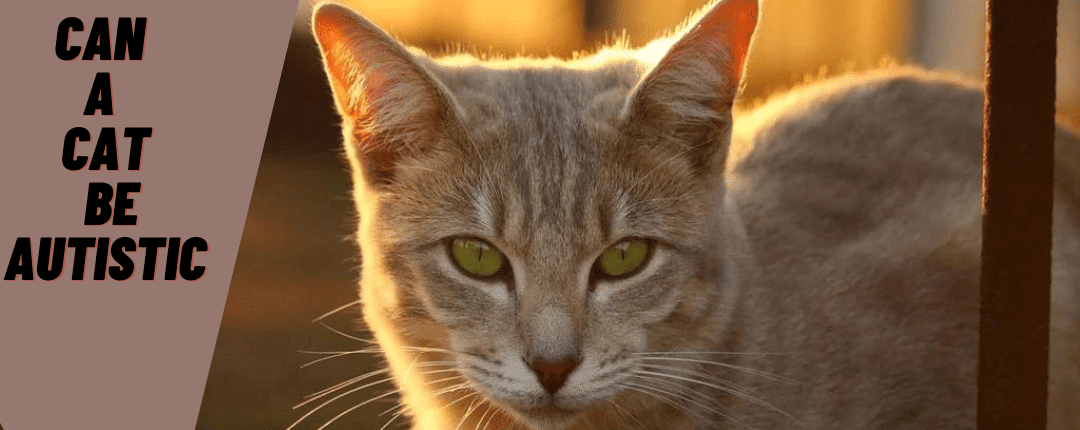Are cats capable of exhibiting autistic-like behaviors? This intriguing question captures the curiosity of many pet owners and animal enthusiasts. While the comparison between human autism and feline behavior is complex, exploring this topic sheds light on the mysterious world of our feline friends.
Join us as we delve into the fascinating realm of cat behavior, unraveling the similarities, differences, and what they mean for our understanding of these beloved pets.
Exploring the Concept of Autism in Cats

Autism is a complex neurological condition in humans. It affects communication and behavior. People with autism may have trouble with social interactions. They might show repetitive behaviors, too. Understanding autism in humans helps us explore similar traits in cats.
Can Animals, Including Cats, Exhibit Autistic-Like Behaviors?
Animals, like cats, may show behaviors that seem autistic. These include repetitive actions and social challenges. But it’s important to note that these behaviors don’t always mean autism. They can be expected for some cats or signs of other issues.
Scientific Perspective on Autism in Cats
From a scientific view, diagnosing autism in cats is not straightforward. Research in this area is limited. Scientists look at cat behavior and brain function. They aim to understand if cats can have conditions like autism. This research is still in early stages.
Recognizing Autistic-Like Behaviors in Cats
Cats often display unique behaviors. Some mirror autistic-like symptoms in humans. These include limited social interaction and repetitive movements. However, such behaviors can be normal for cats. It’s crucial to distinguish between typical cat behavior and signs that may suggest more.
Case Studies and Anecdotal Evidence
Many cat owners share stories about their pets’ unusual behaviors. Some describe patterns that resemble autism. These accounts provide valuable insights. Yet, they are not scientific proof. Each case is different and needs careful evaluation.
Expert Opinions and Veterinary Insights
Veterinarians and animal behaviorists offer expert views. They stress the importance of thorough assessments. Signs that seem autistic-like might be due to stress, illness, or environment. Experts recommend observing the cat’s overall behavior and health for accurate understanding.
Differentiating Between Autism and Other Feline Conditions
Several medical issues in cats show symptoms like those seen in autism. These include sensory disorders and neurological problems. Cats with these conditions might avoid social interactions or show repetitive behaviors. It’s vital to consult a vet for a proper diagnosis.
Behavioral Disorders in Cats: Separating Fact from Fiction
Behavioral disorders in cats are often misunderstood. Some behaviors are quickly labeled as autistic-like. But, they can be signs of stress, anxiety, or other issues. Understanding these disorders requires careful observation and professional advice.
The Role of Genetics and the Environment
Genetics and environment play key roles in a cat’s behavior. Some traits are inherited. Others are responses to their surroundings. It’s essential to consider both factors. They help understand a cat’s behavior and distinguish it from conditions like autism.
Caring for a Cat with Autistic-Like Behaviors
Cats with autistic-like behaviors need a safe, calm space. Reduce loud noises and sudden changes in their environment. Offer hiding spots and comfortable resting areas. Consistency in their daily routine also helps. This approach eases stress and supports their well-being.
Behavioral Training and Management Strategies
Behavioral training can improve your cat’s life. Use positive reinforcement to encourage good behavior. Avoid punishment as it can cause stress. Introduce new activities slowly. This helps in managing their behaviors effectively and gently.
When to Seek Veterinary Help
If you notice changes in your cat’s behavior, consult a vet. They can rule out medical issues that might cause these behaviors. Early intervention is key. It ensures your cat gets the right care and support.
The Debate Around Labeling Animal Behaviors
Diagnosing animals with human conditions like autism is complex. It raises ethical questions. Animals cannot express their feelings in words. This makes accurate diagnosis challenging. Ethical care means treating animals based on their needs, not just human interpretations.
The Humanization of Pet Behaviors
People often view pet behaviors through a human lens. This is called anthropomorphism. It can lead to misinterpreting animal actions. Recognizing that animal behavior has its context is essential. It ensures pets are understood and cared for appropriately.
Perspectives from Animal Behaviorists
Animal behaviorists offer valuable insights. They study animal actions scientifically. Their perspective helps separate normal behaviors from potential issues. They caution against quick judgments based on human standards. Their expertise guides better understanding and care for animals.
Read more about: parivahan-sewa.com
Conclusion
Can cats be autistic? Opens a complex and fascinating discussion about feline behavior. While there are similarities between certain cat behaviors and autistic-like symptoms in humans, it’s crucial to approach this topic with care and scientific understanding. Recognizing and respecting the unique nature of our feline companions, rather than hastily applying human conditions to them, is essential for their well-being and our relationship with them.
Read more about: timeshighfacts






